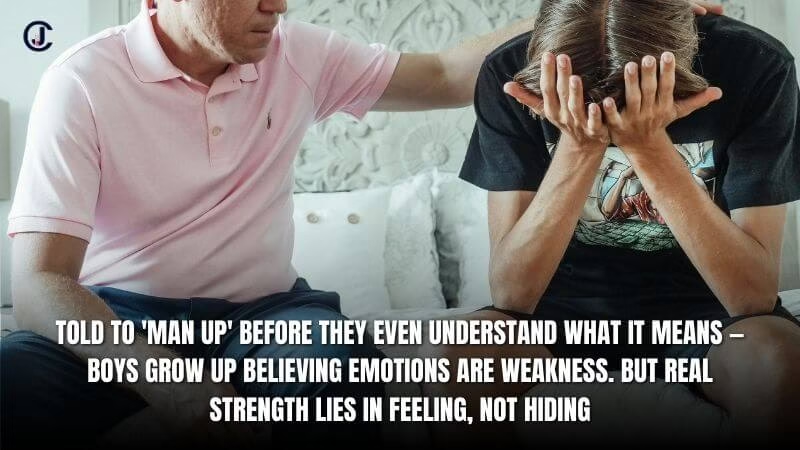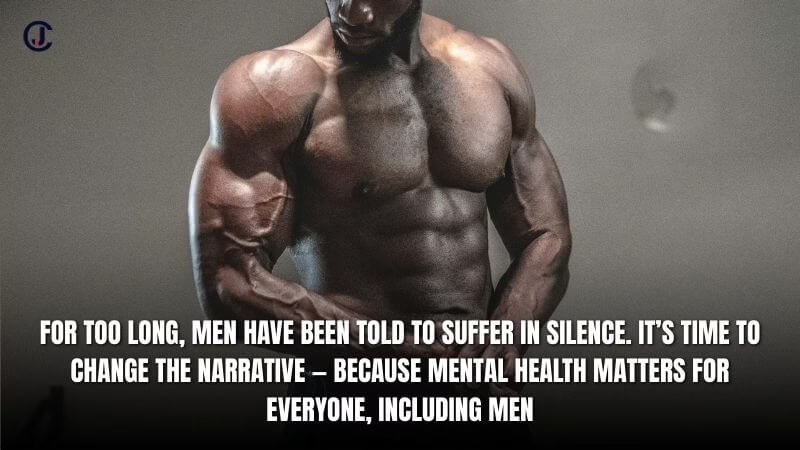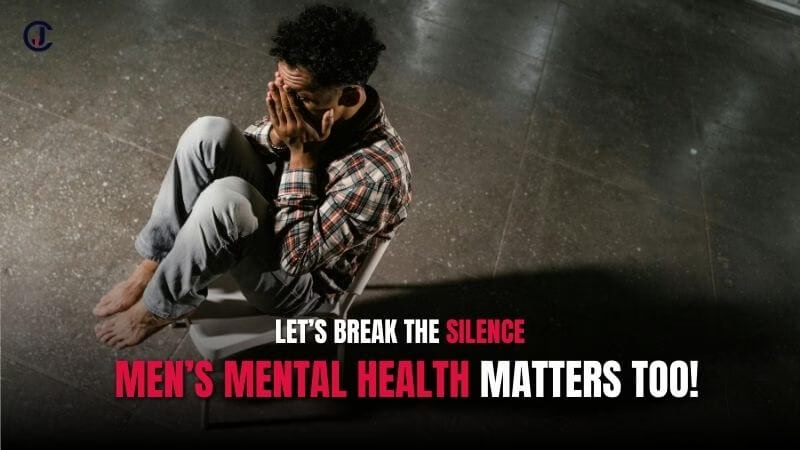Table of Contents
Men’s mental health has become the subject of a strong worldwide debate in recent years, particularly after the pandemic. More so than ever, people are challenging traditional notions about manhood and the emotional armor males are raised to wear. The spotlight is finally turning on the men’s mental health —a field long covered in secrecy—as society starts to address the emotional difficulties of half of its people.
Every June, during Men’s Health, this conversation picks up momentum monthly. Although debates about prostate checks and cholesterol levels are vital, men’s mental health merits equal consideration. For many men, nevertheless, out-of-date concepts of masculinity continue to pose a major obstacle. Like stoicism, emotional suppression, and the pressure to be a “provider,” these internalized ideas stop many men from seeking assistance when they most need it.
This article investigates deeply how masculinity affects men’s mental health, why it has grown popular, and what we can do together to change the story.
The Silent Struggle: A Global Mental Health Crisis Among Men
As per statistics produced by WHO, about 7 hundred thousand people go on to commit suicide every year, in which men form almost 75% of the total. In the U.S., men are about four times more likely to commit suicide than women. Men are much less likely to look for mental health help even in light of these terrifying numbers.
These are friends, sons, husbands, fathers, and brothers; they are not only data. And their quiet mostly results from cultural and social expectations connected to masculinity.
Understanding Traditional Masculinity
What Is Masculinity?
Masculinity is a term that usually describes certain traits or behaviors and roles assigned to boys and men. Traditionally, it is not viewed as negative; however, it becomes toxic when it does so by repressing emotions and looking down upon anything considered “feminine,” all in the method of attempting to assert dominance.
The Problem With Toxic Masculinity
Toxic masculinity isn’t about men being toxic – it’s a toxic set of social expectations. Some of its key tenets include:
- Suppressing emotions (except for anger)
- Avoiding vulnerability
- Maintaining dominance and control
- Being the breadwinner at all costs
- Avoiding anything deemed “weak” or “feminine”
These beliefs may be passed down through families, reinforced by media, or absorbed from peer groups. But over time, they carve out emotional isolation, shame, and a fear of appearing “less than a man.”
How Masculinity Becomes a Mental Health Barrier

1. Emotional Repression
Many boys get bad advice from a very early age-“man up,” “stop crying,” or “be strong.” Such messages dehumanize the expression of emotion and foster the rather unfortunate idea that expressing emotions shows weakness.
As men grow older, this may lead to situations such as:
- Poor emotional regulation
- Difficulty forming close relationships
- Bottled-up stress and frustration
2. Reluctance to Seeking Help
Another indefensible attribute of toxic masculinity has been stigmatizing seeking therapy or counseling. Men are usually afraid of being judged or considered weak or incapable of handling their own problems.
The American Psychological Association (APA) in a 2021 study reported that while men and women suffer mental health concerns at about the same frequency, men are way less likely to go for mental health services.
3. Pressure to Perform
Many men have a feeling of intense stress to make a living for themselves, to be physically fit, and be emotionally impermeable. Failing to actualize these standards may bring about:
- Chronic stress and anxiety
- Imposter syndrome
- Depression
4. The Mask of Masculinity
Masculine masks are personas that men put on to hide their pain; Author Lewis Howes coined the term “mask of masculinity.” The mask-as in the “stoic,” “aggressor,” or “joker”-work as emotional armor. Behind the mask, however, most men secretly experience loneliness, shame, and being misunderstood.
Masculinity and the Pandemic: A Turning Point
The COVID-19 pandemic stands as a shared trauma of isolation, uncertainty, and loss. For many men, it also tore down the walls erected by toxic masculinity.
- Job losses challenged the “provider” identity.
- The isolation and working-from-home environment strangled the traditional support systems for many men.
- Heightened anxieties and depression persuaded more men to seek help, many for the first time.
The pandemic was, truely, a devastating one; however, it also acted as a wake-up call. Across the globe, a realization dawned upon men that vulnerability is not a weakness-the very human trait it is.
Cultural Shifts and the Rise of Vulnerability
1. Celebrity Advocacy
High-profile male figures have begun speaking openly about their mental health:
- Dwayne “The Rock” Johnson has spoken about depression.
- Prince Harry discussed therapy and grief on public platforms.
- Michael Phelps, the Olympic swimmer, is now a vocal mental health advocate.
Their openness is chipping away at stigma and redefining what strength looks like.
2. Media and Entertainment
Movies, shows, and books are now portraying male characters with emotional complexity:
- Ted Lasso addresses male vulnerability with humor and heart.
- BoJack Horseman dives deep into depression and trauma.
- Euphoria explores addiction, identity, and masculinity through male characters.
Such portrayals encourage viewers to embrace their emotional depth.
3. Social Media Movements
Hashtags such as #MenToo, #MentalHealthAwareness, and #EndTheStigma have formed online communities whereby men feel allowed to reveal their struggles. Influencers, therapists, and coaches are taking mental health content to TikTok and Instagram, providing digestible, relatable, and specific information for men.
The Intersection of Masculinity and Identity

Race, Culture, and Ethnicity
Masculinity is not a one-size-fits-all concept. It is deeply shaped by culture and identity. For example:
- In Black communities, men are often pressured to maintain their strength against systemic racism.
- Asian cultures tend to stigmatize being open about mental health matters due to stoicism and fear of sullying family reputation.
- Latino men may feel bound by machismo, a cultural code emphasizing toughness and authority.
These additional layers can make mental health support even more inaccessible for marginalized men.
LGBTQ+ Men and Masculinity
Gay, bisexual, and transgender men often navigate the added complexity of societal rejection and internalized shame. The struggle to conform to heteronormative masculinity while embracing one’s identity can cause:
- Body image issues
- Anxiety and depression
- Higher suicide rates
Addressing men’s mental health must include intersectional awareness and culturally competent care.
Breaking the Cycle: What Needs to Change
1. Redefining Masculinity
We need a new definition of masculinity—one that embraces:
- Emotional literacy
- Compassion
- Healthy relationships
- Seeking help as a sign of strength
Masculinity should evolve to include human wholeness, not just resilience and power.
2. Early Intervention
Mental health education should begin early in life. Schools can:
- Teach boys emotional vocabulary
- Encourage empathy and communication
- Normalize help-seeking behavior
When boys learn it’s okay to feel, they grow into men who thrive emotionally.
3. Workplace Wellness
Since men often spend a large portion of their lives at work, employers can:
- Offer confidential mental health services
- Promote a culture of openness
- Encourage work-life balance
Workplaces that support mental health also benefit from higher productivity and employee retention.
4. Representation Matters
Mental health campaigns must reflect diverse male experiences. Seeing someone who “looks like me” can be a powerful motivator for seeking help.
- Include men of different races, ages, sexual orientations, and body types
- Highlight real stories of struggle and recovery
Representation reduces shame and increases relatability.
Steps Men Can Take Toward Better Mental Health

1. Talk About It
Whether it’s with a friend, partner, therapist, or online forum—talking is healing. Expressing your emotions reduces their power over you.
2. Practice Self-Awareness
Take time to notice your internal world. Journaling, mindfulness, or even regular check-ins with yourself can help you identify stressors before they escalate.
3. Build a Support Network
Friendships aren’t just for fun—they’re a lifeline. Surround yourself with people who support your well-being.
4. Seek Professional Help
Therapists, counselors, and coaches are trained to help. Seeking therapy is not a sign of weakness—it’s an act of courage.
5. Challenge Toxic Beliefs
Ask yourself: Where did my ideas about masculinity come from? Are they serving me? Let go of beliefs that harm your emotional health.
Resources for Men’s Mental Health
| Resource | Description |
| HeadsUpGuys | A Canadian-based site supporting men with depression. |
| Man Therapy | A humorous yet powerful platform with tools and therapy referrals. |
| Movember Foundation | Focuses on mental health, suicide prevention, and men’s health awareness. |
| BetterHelp / Talkspace | Online therapy platforms with licensed professionals. |
| National Suicide Prevention Lifeline | Call or text 988 for immediate crisis support (U.S.). |
Final Thoughts: Redefining What It Means to Be a Man
Although there is still work to do, the story around men and mental health is evolving. Masculinity does not have to consist of silence, stoicism, or solitary agony. There is also beauty in openness, emotional intelligence, and the courage to say, “I need help.”
In the celebration of Men’s Health Month, let us think about mental health as a human matter rather than one attached to gender. Breaking the standard of conventional masculinity lets men be seen, heard, and healed.
Call To Action
You are not alone if you’re a guy going through mental health problems; there is help available. Begin by contacting a buddy, then participate in a support group or meet a therapist. Should you have men in your life, create that secure haven. Become used to openness. Inquire about their real condition.
Together, we can help men to be free to feel, communicate, and heal without shame.


4 thoughts on “Mental Health Matters: 5 Powerful Reasons Masculinity Hurts Men”